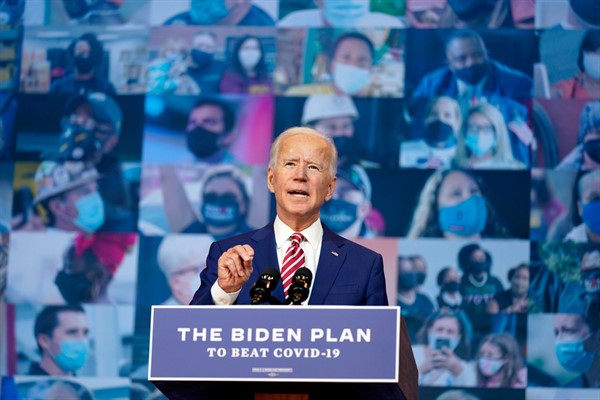Should Joe Biden win the American presidency on Nov. 3, the world will experience whiplash, as the United States performs a second about-face in its posture toward multilateralism in only four years. Although the U.S. has oscillated through cycles of internationalism and isolationism before, it has never executed such a swift and dramatic double-reverse. A Biden triumph would repudiate the “America First” platform on which Donald Trump won the White House in 2016, and the hyper-nationalist, unilateralist and sovereigntist mindset that undergirds it. Such a stunning shift in America’s global orientation would have major implications for global cooperation on everything from climate change, health and nuclear proliferation to trade and human rights, as well as for U.S. relations with its Western allies.
On climate change, a Biden victory would shift the U.S. from laggard to leader. Trump’s decision to withdraw the U.S. from the Paris Agreement on climate change will take effect on Nov. 4, the day after the election. One of Biden’s first steps after inauguration would be to rejoin it, as a component of his proposed $2 trillion climate plan. Crucially, he can do this at the stroke of a pen, because the Obama administration joined the Paris Agreement in 2015 through executive action rather than as a formal treaty requiring the advice and consent of the Senate. A U.S. return to the multilateral fold in the fight against climate change cannot come soon enough. To hold the rise in average global temperatures to 1.5 degrees Celsius, as set out in the Paris Agreement, the world must reduce greenhouse gas emissions by 7.2 percent annually through 2030. Most nations are nowhere near this target. Next year’s U.N. climate change conference in Glasgow, postponed this year because of the pandemic, offers a pivotal opportunity to secure bolder action to avoid planetary catastrophe, an agenda to which Biden has committed.
Once in office, Biden could quickly restore U.S. leadership on global health by reversing Trump’s rash decision to leave the World Health Organization, which is slated to take full effect on July 6, 2021. As with climate change, Biden can rescind Trump’s ill-considered step through simple executive action. Beyond restoring full U.S. membership in the WHO, Biden has advocated strengthening the U.N.’s global health agency. Such steps could include bolstering its authority, so that it can enforce compliance with its legally binding International Health Regulations, as well as augmenting its capabilities, to better detect and respond to pandemics. Biden would also likely support collaborative international efforts to develop and ensure the equitable allocation of COVID-19 vaccines and treatments, rejecting the “vaccine nationalism” of his predecessor. This could include joining COVAX, a joint initiative of more than 170 countries pooling their resources for a COVID-19 vaccine—but not yet the U.S.

